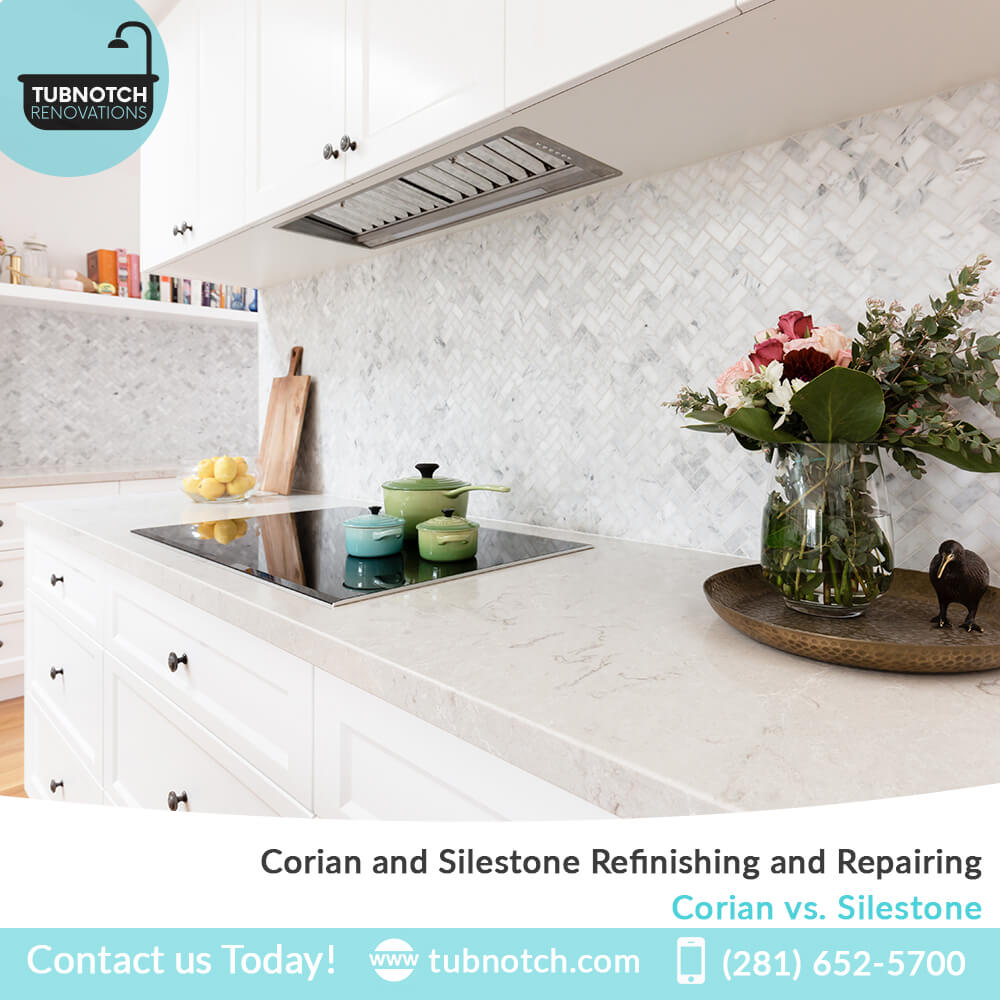Corian and Silestone Refinishing and Repairing
Corian vs. Silestone: How Do These Manmade Surfaces Compare?
Corian and Silestone are often mentioned in the same breath when discussing kitchen countertop materials like they are just different brands of the same type of material.
How do these two popular countertop surfaces compare?
Bottom Line
Corian and Silestone are vastly different; they do not even belong in the same category. While both are quality products, Corian falls in the category of solid surface materials while Silestone belongs in the engineered stone (i.e., “quartz”) category.
Solid surface means that the product has a high amount of resins; quartz means that the product has about five times less resins, making it the more stone-like material of the two.
Can one product be considered better than the other? From a resale standpoint, quartz countertops currently rate higher among home buyers than solid surfaces. Yet solid surfaces are generally priced lower than quartz countertops.
Composition: What Are They Made Of?
One area of concern among homeowners is whether the product is deemed “natural” or “plastic.” Of the two, Corian would be the more “plastic” product, but not by much.
Based on technical data, Silestone has roughly 28% more minerals than Corian. Other than the idea that one–Corian–has more polymers than the other, Silestone’s greater mineral content does not matter much in terms of performance and appearance.
Corian – Made of about 33% acrylic resin (PolyMethyl MethAcrylate) and about 66% natural minerals chiefly derived from bauxite. Bauxite is the same ore from which aluminum is extracted.
Silestone – 94% natural quartz, with the remainder devoted to binding resins. Silestone is sometimes erroneously referred to as granite. It is not. Granite countertops are quarried straight from the earth and cut into slabs. Silestone is an aggregate.
Porosity and Stain Resistance: How Permeable Are They?
No countertop material completely resists staining.
Warranty: How Long Does the Company Stand Behind the Product?
Both DuPont (Corian) and Cosentino (Silestone) offer warranties:
Corian – 10 year limited.
Silestone – 15 year limited.
Number of Colors: What Are Your Choice?
Likely, you will find enough colors from either manufacturer to satisfy your style needs, since both are viable, popular product lines.
Silestone has pared down its palette of colors in the last few years, while Corian has added about seven into the mix.
Corian – 107 colors.
Silestone – 60 colors.
Source: ThePruce
TubNotch Renovations offers not only utility/functionality but also elegance. Our unequivocal and affordable refinishing, repairing, resurfacing, and replacement options that give you the new surfaces for your old bathtub/shower liner and kitchen/bathroom countertops.

Corian vs. Silestone: How Do These Manmade Surfaces Compare?
Bathtub refinishing and repairing in Houston, Bathroom refinishing and repairing in Houston, Tile Shower refinishing and repairing, Shower Pan refinishing and repairing, Bathroom Vanity refinishing and repairing, Porcelain tub refinishing and repairing, Fiberglass Bathtub refinishing and repairing, Acrylic Bathtub refinishing and repairing, Clawfoot Bathtub refinishing and repairing, Countertop refinishing and repairing, Laminate Countertops refinishing and repairing, Formica Countertops refinishing and repairing, Tile Countertops refinishing and repairing, Corian and Silestone refinishing and repairing, Bathroom Vanity refinishing and repairing, vanity top refinishing and repairing, ceramic sink refinishing and repairing, kitchen countertop refinishing and repairing, Granite countertop refinishing and repairing, Ceramic Tile refinishing and repairing, Tile Countertops refinishing and repairing, Tile Walls refinishing and repairing, Tile Shower refinishing and repairing, Shower Pan refinishing and repairing, Tile Floors refinishing and repairing, Tiled kitchen refinishing and repairing, Ceramic floors refinishing and repairing, Porcelain finish refinishing and repairing.
